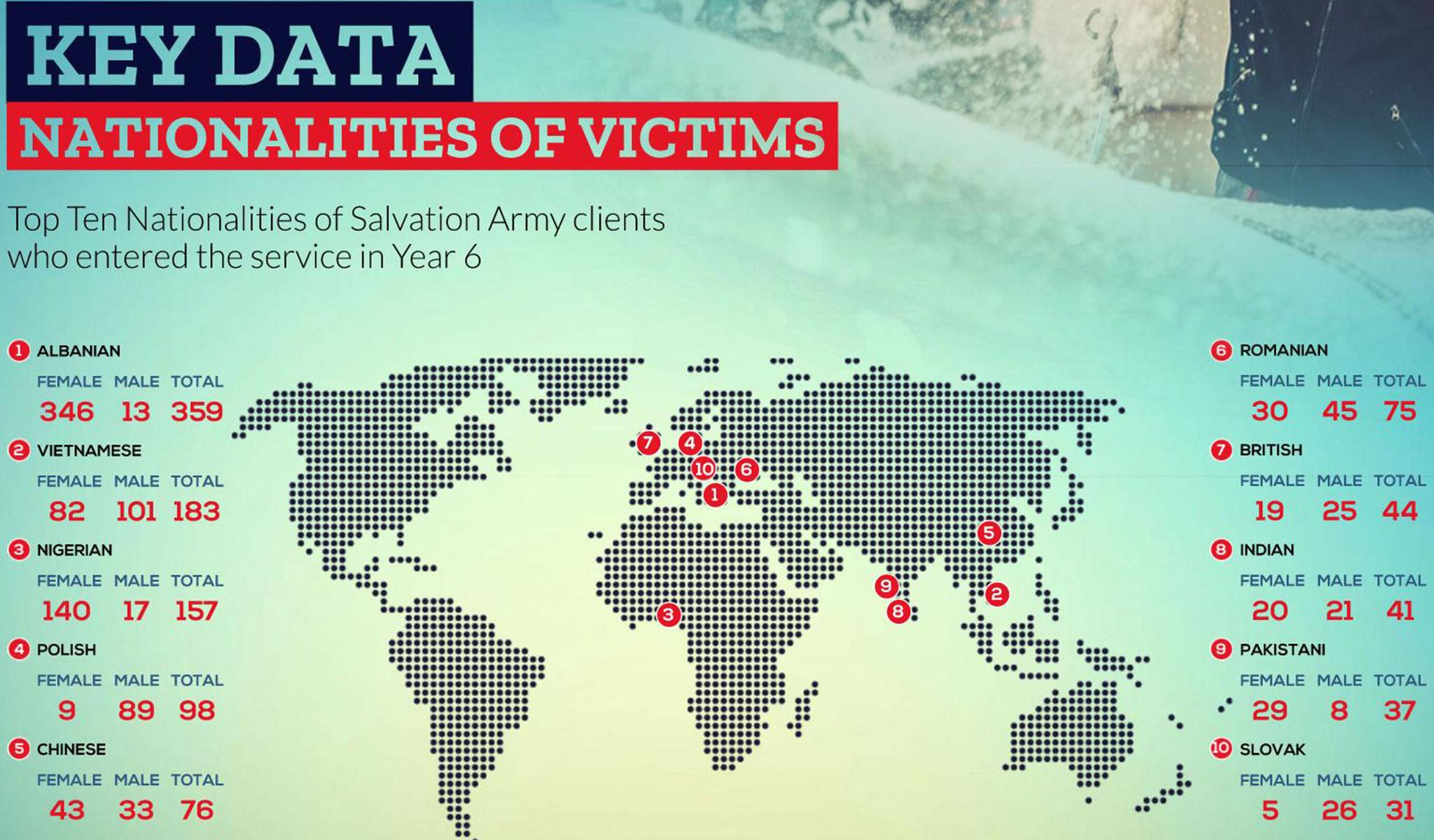Number of modern slavery victims identified in England and Wales rises by 300%
Salvation Army reveals increasing number of Vietnamese men found working in cannabis farms

The number of modern slavery victims receiving help has risen by 300 per cent as thousands more continue to be forced into labour, prostitution and domestic servitude across the UK.
A person trafficked for organ removal was among those referred to the Government’s programme and the past year has seen a spike in Vietnamese men working in cannabis farms.
The Salvation Army, which supports all adult victims of modern slavery identified via the National Referral Mechanism, said the programme had seen a dramatic increase in demand since it started in 2011.
More than 1,500 people were referred in the past year alone, with almost half trafficked for sexual exploitation, 39 per cent for forced labour and 13 per cent for domestic servitude in England and Wales.
The victims identified in the past year came from 95 countries, with almost two thirds women, one third men and three transgender.
The report came after The Independent and The Evening Standard revealed the scale of modern slavery in the UK with the Slaves on our Streets campaign.
The Salvation Army said there was no sign of victims slowing and warned that although most cases uncovered so far were in London, referral had come from across the country, “demonstrating the prevalence of this problem and the need for everyone to be alert to the signs of modern slavery in their own communities”.

The highest number of female clients being supported are Albanian, followed by Nigerians, but the largest group of men are now from Vietnam for the first time.
A total of 183 victims from the country were referred in the past year, with the men mainly exploited in cannabis farming and women in nail bars and the sex industry.
One victim was 16 when his mother sold their family home in Vietnam to pay £10,000 for him to be smuggled to join his father in the UK.
He was taken to a cannabis farm in a flat above a shop in England, the Salvation Army said, and “made to work long hours in unbearable heat with no pay and only occasional food brought every couple of days by a man who would leave again and lock the door behind him after just a few minutes”.
Police referred the victim, known as T, to a foster family after a raid shut the factory down but he fled back to traffickers in the hope of being reunited with his father and was made to work setting up more cannabis farms across the UK for several more years.
The gang later forced T into prostitution because his supposed debts had passed £100,000, beating him and threatening to hurt his parents after he tried to run away.
“T was forced to go from one small hotel to another, sleeping with both men and women and receiving no more than £100 a month,” the Salvation Army said, with the man only referred after being arrested at another cannabis farm and sent to an immigration detention centre.
Another victim, from Nigeria, was forced into domestic labour in his home country after being orphaned as a young child.
He was trafficked to the UK at the age of 16, by a family who imprisoned him in their home, forcing him to clean the house and care for the children for six years until he escaped through a kitchen window.
The number of modern slavery victims from China, India and Pakistan have all increased and Britain is in the top 10 of source countries, with 44 British people supported.
As well as its work in the UK, the Salvation Army is running projects to raise awareness about trafficking in Nigeria and the Philippines.
Anne Read, the Salvation Army’s director for modern slavery, said the huge rise in referrals showed progress in the way the crime was being tackled.
“We are strongly committed to working in partnership and believe that there is more to be achieved when we combine forces and collaborate in our efforts to prevent trafficking and protect its victims,” she added.
The charity draws up support plans for victims, who can choose to return to their country of origin or receive legal advice on how to stay the UK, receiving financial support, counselling, training and education.
Most victims are currently referred by the Home Office, followed by police, charities, immigration authorities and lawyers.
The Modern Slavery Act was passed in 2015 to bring together trafficking and slavery offences, requiring large companies to examine their supply chains and issuing new guidance on obligatory reporting.
The UK has also doubled its global development spending on modern slavery to £150m.
Join our commenting forum
Join thought-provoking conversations, follow other Independent readers and see their replies
Comments
Bookmark popover
Removed from bookmarks